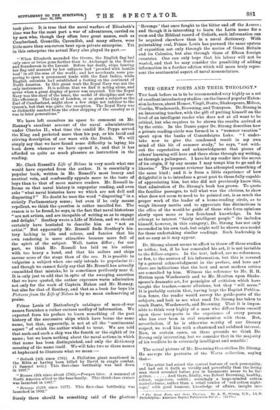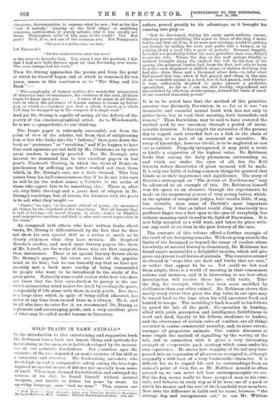THE GREAT POETS AND THEIR THEOLOGY.*
THE book before us is to be recommended very highly as a set of excellent introductory studies : on the lines of popular Exten- sion lectures, about Homer, Virgil, Dante, Shakespeare, Milton, Goethe, Wordsworth, Browning, and Tennyson. Dr. Strong is an interesting teacher, with the gift of putting himself on the level of an intelligent reader who does not at all want to be critical, but who requires to be shown the results arrived at by the critic. In the Dante paper Dr. Strong describes how a private reading-circle was formed in a "summer vacation" spent upon the banks of Canandaigua Lake. " I under- take now to give the condensed result in my own mind of this bit of summer study," he says, " not with- out the expectation and acknowledgment that pieces of others' learning will here and there shine through my writing, as through a palimpsest. I have let my reader into the secret of its origin, if by any means I may tempt him to go and do likewise." The present reviewer has attempted something of the same kind; and it is from a little experience of how delightful it is to introduce a great poet to those fully capable of appreciating him, but who did not previously know this, that admiration of Dr. Strong's book has grown. To quote the familiar passages, to tell what was the obvious, to show what does not seem to need to be pointed out, is as much the proper work of the leader of a home-reading circle, as to
weigh literary merits and to appreciate fine distinctions is the office of the would-be guide of those who form opinions slowly upon more or less first-hand knowledge. In his attempt to interest "fairly intelligent people" (he includes himself, however, in this category), Dr. Strong has not only succeeded in his own task, but might well be shown as a model for those undertaking similar readings. Such leadership is not so easy as it may appear.
Dr. Strong almost seems to affect to throw off these studies as trifles ; but, if he has concealed his art, it is not invisible to the fellow-augurs. In the text, indeed, are no references, or few, to the sources of his information, but this is covered by a general acknowledgment in the preface, and here and there are indications that the best and most modern critics are consulted by him. Witness the reference to Mr. R. H. Hutton upon Wordsworth and to Mr. Moulton upon Shake- speare's dramatic art, for principles of criticism which have taught the teacher,—mere allusions, but they "will serve." It is probably certain that, having leapt the Baptist Publica- tion fence, the reader would survey the guide-posts of the subjects, and look to see what road Dr. Strong has taken to reach Dante, Wordsworth, and Browning. That it is impos- sible to think very highly of a man who differs from oneself upon these test-poets is the experience of every person who has ever been in real communion with them. But, nevertheless, if he is otherwise worthy of our literary respect, we read him with a chastened and subdued interest.
Now, in certain cases, on these grounds we think Dr. Strong only interesting, but we consider that in the majority of his verdicts he is extremely intelligent and sensible
The actual picture of Mr. Browning thus strikes Dr. Strong. He surveys the portraits of the Watts collection, saying that- " The artist had seized the central feature of each personality, and bad set it forth so vividly and powerfully that the living man stood revealed before you in lineaments never to be for- gotten. . . . And there, finally, was Robert Browning, healthy, robust, sagacious, subtle ; seemingly a large-minded cotton manufacturer, rather than a retail vendor of ' red cotton night- caps,' with good humour, knowledge of affairs, insight into • The Great Poets and their TIvo'oqy. By A. H. strong, D.D LL.D. Philadelphia: American Baptist Publication Soo et . [3.1 Vic.)
character, determination to express what he saw ; but as for the soul of melody,' `singing as the bird sings,' or anything sensuous, sentimental, or purely artistic, why it was simply not there. Philosopher, critic of life, man of the world? Yes. But poet ? Well, if so, not one of the common sort. Not Tennyson's
' The poet in a golden clime was born,'
but Emerson's
' The free winds told him what they knew,'
is the verse to describe him. Yet, when I saw the portrait, I felt that I had new light thrown upon all that Browning ever wrote. The man interpreted his work."
Then Dr. Strong approaches the poems, and from the point at which he himself began and at which he remained for ten years, comes to this conclusion as to "The Ring and the Book " The complexity of human motive, the wonderful interaction of character and circumstances, the vastness of the soul, all these
begin to dawn upon you I know of no poem in all litera- ture in which the greatness of human nature so looms up before you, or which so convinces you that a whole heaven or a whole hell may be wrapped up in the compass of a single soul."
And yet Dr. Strong is capable of seeing all the defects of the poetry of the cinematographical artist. As to Wordsworth, he is not so sympathetic, to our thinking.
The Dante paper is extremely successful, not from the point of view of the scholar, but from that of enlightening him or her who looks into the " Inferno," then puts down the book as "grotesque" or "revolting," and if he happen to hear that such opinions are not held by Mr. Gladstone, or by other great readers, is merely puzzled. For Dr. Strong's own interest we commend him to two excellent papers in last year's Nineteenth Century, in which the views of Dante on purification by suffering are better worked out than those which, in Dr. Strong's case, are a little biassed. This bias comes from his half-consciousness that if he do not take care he will be (in the widest sense) a Catholic in the midst of those who expect him to be something else ! There is, after all, very little theology and a great deal of religion in Dr. Strong's teachings, but, of course, his business with the poets is to ask what they taught :—
" Dante," he says, "is the most ethical of poets,—he measures all things by the standard of the Sanctuary. But all beauty that is real or lasting—all moral beauty, in short—wakes in Dante's soul responsive emotions and finds a calm and sweet expression in his verse."
As compared with others who have written books about books, Dr. Strong is differentiated by the fact that he does not show his own special skill as a writer so much as he clearly evidences what they have written. Mr. Stopford Brooke's studies, and much more literary papers like those of Mr. Lowell, are the works of those who are first essayists, then instructors. There is no special literary flavour about Dr. Strong's papers ; his views are those of the popular mind at its best ; but we can honestly say that we have not recently met a book more worthy of being commended to people who want to be introduced to the study of the great poets. Naturally none could read or write here who does not know that the best introduction to poetry is the one which an inquiring mind makes for itself by reading the poets, —especially if left alone with them in early youth. But there is a large class which, in spite of being called educated, has never at any time been turned loose in a library. To it, and to all who have to cater for it, we recommend Dr. Strong as a pleasant and encouraging guide, and a very excellent giver of what may be called model lessons in literature.



















































 Previous page
Previous page